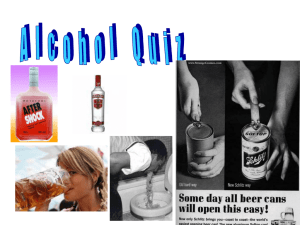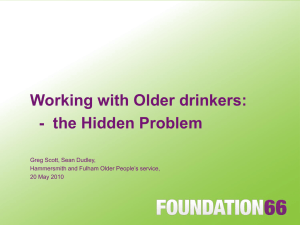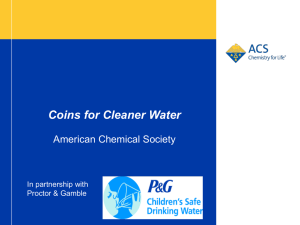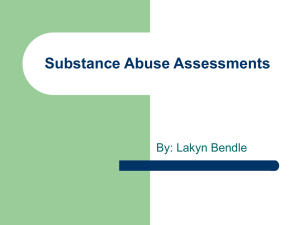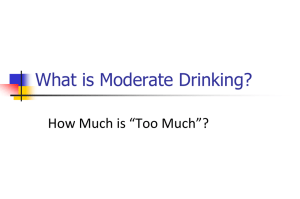The association between educational achievement
advertisement
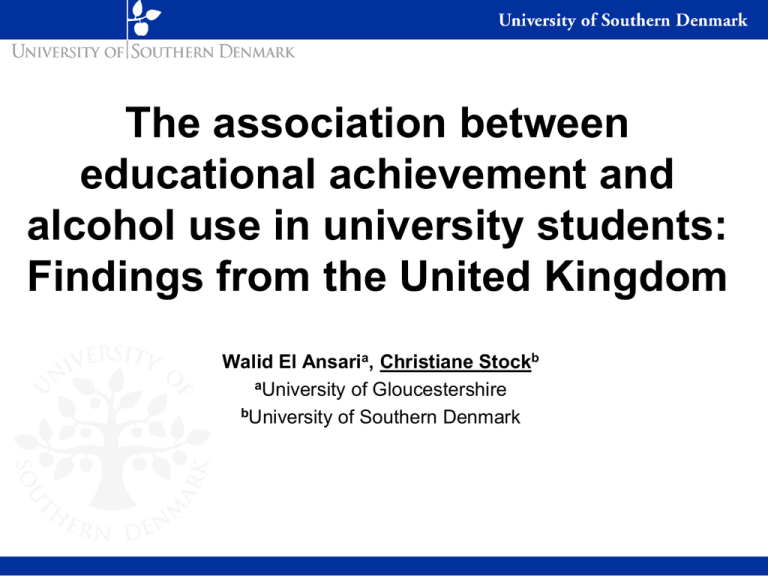
The association between educational achievement and alcohol use in university students: Findings from the United Kingdom Walid El Ansaria, Christiane Stockb aUniversity of Gloucestershire bUniversity of Southern Denmark Unit for Health Promotion Research Background • The relationship between problematic alcohol consumption and academic performance is a key concern on university and college campuses. • Alcohol consumption has been negatively associated with academic performance. • Only few studies have used objective measures of academic performance. • Few authors have analysed whether frequency of drinking or amount of alcohol is more important in predicting academic performance. Unit for Health Promotion Research Aims • This study examined the associations between three academic achievement variables and three alcohol consumption variables (frequency of alcohol consumption, heavy episodic drinking, and problem drinking). Which of the measures of alcohol consumption is most influential? Which academic outcome is mostly affected by alcohol drinking? Unit for Health Promotion Research Methods Data collection Cross-sectional study among 380 university students at the University of Gloucestershire who completed a general health questionnaire. Their module grades were retrieved from the university computer systems Alcohol drinking Frequency of alcohol consumption in the past three months Heavy episodic drinking (had ≥ 5 drinks in a row) in the past 30 days Problem drinking (CAGE score) Educational achievement Students’ reflection on their academic achievement (importance of achieving good grades) Students’ subjective comparative appraisal of their overall academic attainment (academic performance in comparison with their peers) Actual module mark Unit for Health Promotion Research Frequency of alcohol consumption 50 40 30 20 P=0.04 10 Females Males 0 Never Less than once a week Once a week Several times a week All Every day Several times a day Unit for Health Promotion Research Had five or more drinks in a row last month 30 25 20 15 10 5 0 p<0.001 None Females Males 1 time 2 times 3-5 times All 6-9 times 10 or more times Unit for Health Promotion Research Problem drinking (positive answers in CAGE) 30 25 20 15 P=0.04 10 Females 5 Males 0 1 positive answer 2 positive answers All 3 positive answers 4 positive answers Unit for Health Promotion Research Characteristics of educational achievement Variable Whole Male Female sample (N= 195) (N= 185) (N= 380) Importance of having good grades at University Very important 64.1 61.7 66.7 Somewhat important 34.3 36.3 32.2 Not very important 1.3 1.6 1.1 Not at all important 0.3 0.5 0.0 Rating of one’s academic performance in comparison with fellow students Much better 2.1 3.1 1.1 Better 21.3 22.3 20.2 The same 62.5 62.2 62.8 Worse 13.8 12.4 15.3 Much worse 0.3 0 0.5 University Computerised Student Records Module Mark- actual 54.56 53.90 55.68 achieved % grade: Mean (12.9) (12.1) (12.4) (SD) P Value N.S. N.S. N.S. Unit for Health Promotion Research Regression models for three academic achievement indicators on frequency of alcohol consumption* as dependent variable Variable Age Male gender Importance of good grades Performance relative to peers Module marka Adjusted R2 of the model Model 1 Stand. β P Value Model 2 Stand. β P Value Model 3 Stand. β P Value -0.063 0.160 0.238 0.003 -0.047 0.158 0.376 0.003 0.022 0.149 .692 .008 -0.105 0.045 ― ― ― ― ― ― 0.063 0.229 ― ― ― ― ― ― -0.015 0.787 0.04 0.001 0.03 0.004 0.01 0.066 *Frequency of alcohol consumption = from never to several times a day within the last three months Unit for Health Promotion Research Regression models for three academic achievement indicators on heavy episodic drinking* as dependent variable Variable Model 1 Stand. P β Value Model 2 Stand. P β Value Age -0.252 <0.001 -0.235 <0.001 Male gender 0.210 <0.001 0.226 <0.001 -0.142 0.004 ― ― ― ― 0.14 Importance of good grades Performance relative to peers Module marka Adjusted R2 of the model Model 3 Stand. P β Value -0.181 0.001 0.230 <0.00 1 ― ― ― -0.105 0.033 ― ― ― ― ― -0.079 <0.001 0.13 <0.001 0.11 0.132 <0.00 1 *Heavy episodic drinking: frequency of having ≥5 drinks on one occasion Unit for Health Promotion Research Regression models for three academic achievement indicators on problem drinking* as dependent variable Variable Model 1 Stand. β P Value Model 2 Stand. β P Value Model 3 Stand. β P Value Age -0.078 0.146 -0.063 0.242 -0.048 0.400 Male gender 0.147 0.006 0.159 0.003 0.138 0.014 Importance of good grades -0.104 0.047 ― ― ― ― Performance relative to peers ― ― -0.036 0.494 ― ― Module marka ― ― ― ― -0.054 0.327 0.04 0.001 0.03 0.006 0.02 0.038 Adjusted R2 of the model * Problem drinking: number of positive answers in CAGE Unit for Health Promotion Research Results We found relatively strong negative associations between heavy episodic drinking and subjective measures of academic achievement (importance of good grades, academic performance relative to peers). The other two measures of alcohol drinking (frequency of alcohol consumption and problem drinking) showed fewer associations with academic outcomes than heavy episodic drinking. While alcohol drinking was related to impairments in subjectively reported academic achievement, we failed to find associations with objectively measured module marks. Unit for Health Promotion Research Limitations • Sample size • Module mark may not reflect average grades • Selection bias (no data on students not attending classes) • Under-reporting of drinking, while over-reporting of academic performance • No causal relationships • Many other (unmeasured) factors might interfere Unit for Health Promotion Research Other factors Academic achievement at high school Early alcohol use Academic achievement at university Heavy alcohol use Other impairments •Sleep •Socio-emotional problems •Etc. Unit for Health Promotion Research Conclusions • Alcohol misuse, especially heavy episodic drinking is very likely to have negative consequences on academic performance. • Alcohol policies on campus and educational and normative campaigns for students are highly relevant. • Future research should include prospective designs as well as objective and subjective measures for academic performance.

